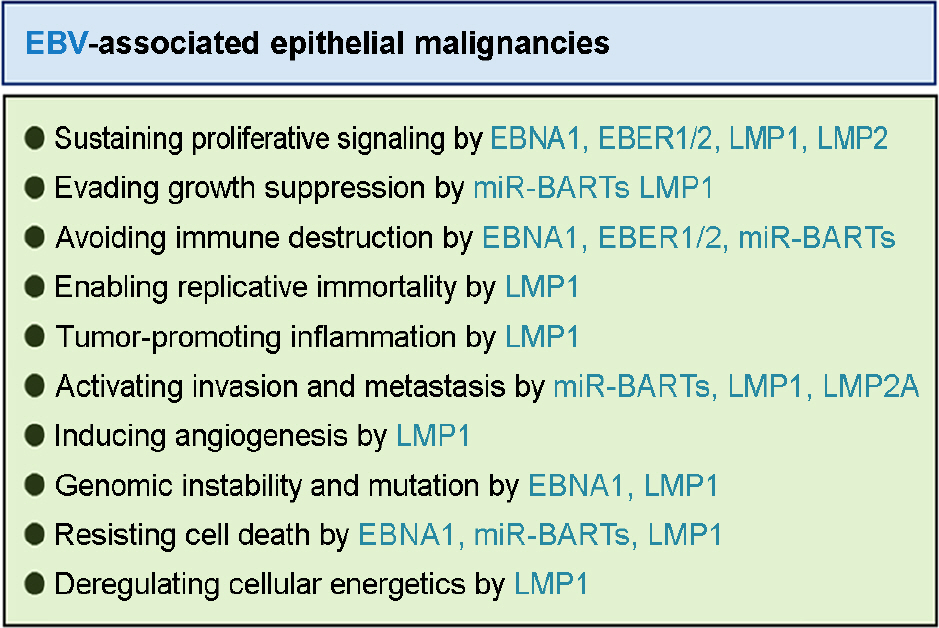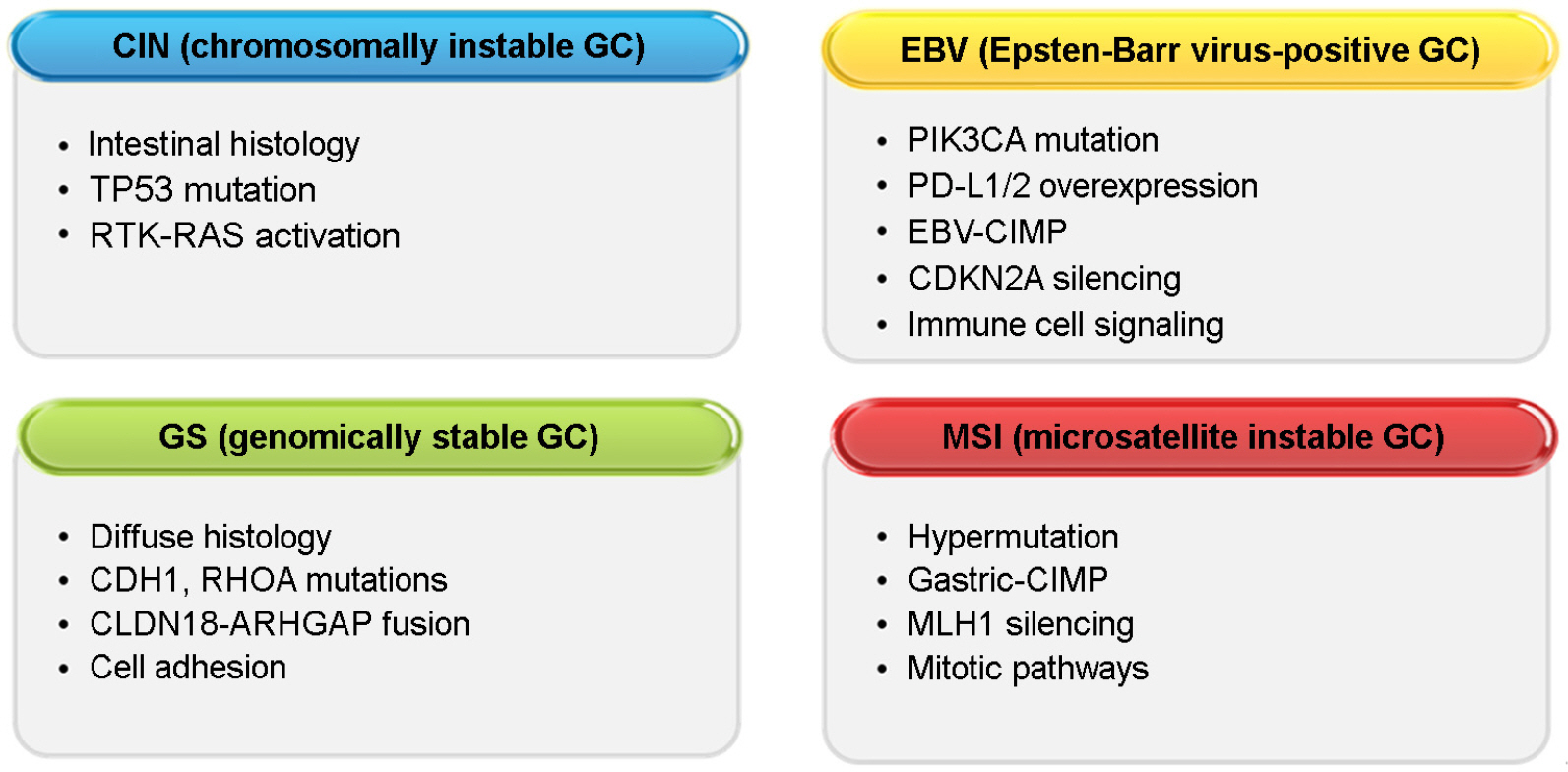J Bacteriol Virol.
2015 Sep;45(3):262-271. 10.4167/jbv.2015.45.3.262.
Current Trends in Studies of Epstein-Barr Virus (EBV) Associated Gastric Carcinoma
- Affiliations
-
- 1College of Pharmacy, Research Institute of Pharmaceutical Sciences, Institute for Microorganisms, Kyungpook National University, Daegu, Korea. hkang72@knu.ac.kr
- 2Institute for Bio-Medical Convergence and Institute for Integrative Medicine, International St. Mary's Hospital and College of Medicine, Catholic Kwandong University, Incheon, Korea.
- 3Department of Medicinal Crop Research, National Institute of Horticultural and Herbal Science, Rural Development Administration, Eumseong, Korea.
- 4Department of Oncology/Hematology, Kyungpook National University Medical Center, Kyungpook National University School of Medicine, Daegu, Korea.
- 5College of Pharmacy, Duksung Women's University, Seoul, Korea.
- KMID: 2068742
- DOI: http://doi.org/10.4167/jbv.2015.45.3.262
Abstract
- EBV infection has been causally associated with incidence of many carcinomas. EBV-associated gastric carcinoma (EBVaGC) has been classified as a unique gastric carcinoma subset, suggesting EBV infection is related to the development of gastric cancer. In this study, general trends of EBVaGC studies for last half-decades were reviewed in several perspectives of clinical significance, virological importance and etiological interests. Throughout this comprehensive reviewing, new study trends of EBV and EBVaGC for next half-decades were suggested.
MeSH Terms
Figure
Reference
-
1). Tsao SW, Tsang CM, To KF, Lo KW. The role of Epstein-Barr virus in epithelial malignancies. J Pathol. 2015; 235:323–33.
Article2). Nishikawa J, Yoshiyama H, Iizasa H, Kanehiro Y, Nakamura M, Nishimura J, et al. Epstein-barr virus in gastric carcinoma. Cancers (Basel). 2014; 6:2259–74.
Article3). Cancer Genome Atlas Research Network. Comprehensive molecular characterization of gastric adenocarcinoma. Nature. 2014; 513:202–9.4). Han J, He D, Feng ZY, Ding YG, Shao CK. Clinicopathologic features and protein expression study of Epstein-Barr virus-associated gastric carcinoma in Guangzhou. Zhonghua Bing Li Xue Za Zhi. 2010; 39:798–803.5). Koriyama C, Akiba S, Shimaoka S, Itoh T, Akiyama S, Eizuru Y. Frequent expression of thymidine phosphorylase in Epstein-Barr virus-associated gastric carcinoma of diffuse type. Anticancer Res. 2010; 30:2431–7.6). Sivachandran N, Dawson CW, Young LS, Liu FF, Middeldorp J, Frappier L. Contributions of the Epstein-Barr virus EBNA1 protein to gastric carcinoma. J Virol. 2012; 86:60–8.
Article7). Tobo T, Hirahashi M, Yao T, Aishima S, Oda Y. Ezrin expression and its phosphorylation in gastric carcinoma with lymphoid stroma and Epstein-Barr virus infection. Mol Clin Oncol. 2013; 1:220–4.
Article8). Chang MS, Kim DH, Roh JK, Middeldorp JM, Kim YS, Kim S, et al. Epstein-Barr virus-encoded BARF1 promotes proliferation of gastric carcinoma cells through regulation of NF-kappaB. J Virol. 2013; 87:10515–23.9). Zhu S, Sun P, Zhang Y, Yan L, Luo B. Expression of c-myc and PCNA in Epstein-Barr virus-associated gastric carcinoma. Exp Ther Med. 2013; 5:1030–4.
Article10). Shinozaki A, Sakatani T, Ushiku T, Hino R, Isogai M, Ishikawa S, et al. Downregulation of microRNA-200 in EBV-associated gastric carcinoma. Cancer Res. 2010; 70:4719–27.
Article11). Marquitz AR, Mathur A, Shair KH, Raab-Traub N. Infection of Epstein-Barr virus in a gastric carcinoma cell line induces anchorage independence and global changes in gene expression. Proc Natl Acad Sci U S A. 2012; 109:9593–8.
Article12). Marquitz AR, Mathur A, Chugh PE, Dittmer DP, Raab-Traub N. Expression profile of microRNAs in Epstein-Barr virus-infected AGS gastric carcinoma cells. J Virol. 2014; 88:1389–93.
Article13). Kim RH, Chang MS, Kim HJ, Song KS, Kim YS, Choi BY, et al. Medical history and lifestyle factors contributing to Epstein-Barr virus-associated gastric carcinoma and conventional gastric carcinoma in Korea. Anticancer Res. 2010; 30:2469–75.14). Li S, Du H, Wang Z, Zhou L, Zhao X, Zeng Y. Meta-analysis of the relationship between Epstein-Barr virus infection and clinicopathological features of patients with gastric carcinoma. Sci China Life Sci. 2010; 53:524–30.
Article15). BenAyed-Guerfali D, Ayadi W, Miladi-Abdennadher I, Khabir A, Sellami-Boudawara T, Gargouri A, et al. Characteristics of epstein barr virus variants associated with gastric carcinoma in Southern Tunisia. Virol J. 2011; 8:500.
Article16). Luo B, Liu M, Chao Y, Wang Y, Jing Y, Sun Z. Characterization of Epstein-Barr virus gp350/220 gene variants in virus isolates from gastric carcinoma and nasopharyngeal carcinoma. Arch Virol. 2012; 157:207–16.
Article17). Chen JN, Jiang Y, Li HG, Ding YG, Fan XJ, Xiao L, et al. Epstein-Barr virus genome polymorphisms of Epstein-Barr virus-associated gastric carcinoma in gastric remnant carcinoma in Guangzhou, southern China, an endemic area of nasopharyngeal carcinoma. Virus Res. 2011; 160:191–9.
Article18). Cheng N, Hui DY, Liu Y, Zhang NN, Jiang Y, Han J, et al. Is gastric lymphoepithelioma-like carcinoma a special subtype of EBV-associated gastric carcinoma? New insight based on clinicopathological features and EBV genome polymorphisms. Gastric Cancer. 2015; 18:246–55.
Article19). Kim do N, Seo MK, Choi H, Kim SY, Shin HJ, Yoon AR, et al. Characterization of naturally Epstein-Barr virus-infected gastric carcinoma cell line YCCEL1. J Gen Virol. 2013; 94:497–506.20). Ku JL, Kim KH, Choi JS, Kim SH, Shin YK, Chang HJ, et al. Establishment and characterization of six human gastric carcinoma cell lines, including one naturally infected with Epstein-Barr virus. Cell Oncol (Dordr). 2012; 35:127–36.
Article21). Saito M, Nishikawa J, Okada T, Morishige A, Sakai K, Nakamura M, et al. Role of DNA methylation in the development of Epstein-Barr virus-associated gastric carcinoma. J Med Virol. 2013; 85:121–7.
Article22). Liu X, Wang Y, Wang X, Sun Z, Li L, Tao Q, et al. Epigenetic silencing of WNT5A in Epstein-Barr virus-associated gastric carcinoma. Arch Virol. 2013; 158:123–32.
Article23). He D, Xiao L, Chen JN, Liang Q, Shao CK. Correlation of Fas/FasL expression to cell apoptosis in Epstein-Barr virus-associated gastric carcinoma. Chin J Cancer. 2010; 29:283–7.24). Lee JM, Kim H, Noh SH, Lee WY, Kim SJ, Park JH. Expression of Epstein-Barr Virus Gene and Clonality of Infiltrated T Lymphocytes in Epstein-Barr Virus-associated Gastric Carcinoma. Immune Netw. 2011; 11:50–8.
Article25). Strong MJ, Xu G, Coco J, Baribault C, Vinay DS, Lacey MR, et al. Differences in gastric carcinoma microenvironment stratify according to EBV infection intensity: implications for possible immune adjuvant therapy. PLoS Pathog. 2013; 9:e1003341.
Article26). Song HJ, Srivastava A, Lee J, Kim YS, Kim KM, Ki Kang W, et al. Host inflammatory response predicts survival of patients with Epstein-Barr virus-associated gastric carcinoma. Gastroenterology. 2010; 139:84–92.
Article27). Huang SC, Ng KF, Chen KH, Hsu JT, Liu KH, Yeh TS, et al. Prognostic factors in Epstein-Barr virus-associated stage I-III gastric carcinoma: implications for a unique type of carcinogenesis. Oncol Rep. 2014; 32:530–8.
Article28). Shin HJ, Kim do N, Lee SK. Association between Epstein-Barr virus infection and chemoresistance to docetaxel in gastric carcinoma. Mol Cells. 2011; 32:173–9.
Article29). Seo JS, Kim TG, Hong YS, Chen JY, Lee SK. Contribution of Epstein-Barr virus infection to chemoresistance of gastric carcinoma cells to 5-fluorouracil. Arch Pharm Res. 2011; 34:635–43.
Article30). Xue QJ, Dai J, Li XZ, Zhu W, Si CP, Chen T. Construction of a recombinant-BCG containing the LMP2A and BZLF1 genes and its significance in the Epstein-Barr virus positive gastric carcinoma. J Med Virol. 2014; 86:1780–7.
Article
- Full Text Links
- Actions
-
Cited
- CITED
-
- Close
- Share
- Similar articles
-
- Epstein-Barr Virus in Human Malignancy: A Special Reference to Epstein-Barr Virus associated Gastric Carcinoma
- Benign Gastric Ulcer with Epstein-Barr Virus Infection Mimicking Malignant Gastric Ulcer
- Anticonvulsant Hypersensitivity Syndrome Associated with Epstein-Barr Virus Reactivation
- Pathology of Epstein-Barr Virus-Associated Gastric Carcinoma and Its Relationship to Prognosis
- Correlation between Expression of p53 and Bcl-2 Protein and Epstein-Barr Virus Detection in Gastric Adenocarcinoma



